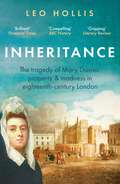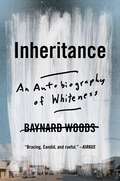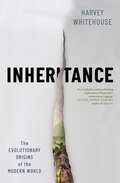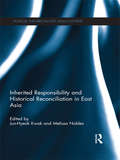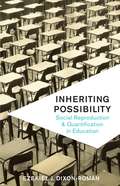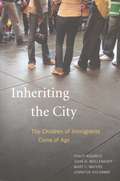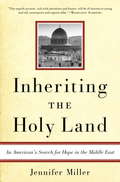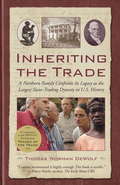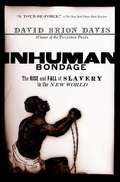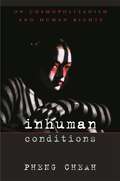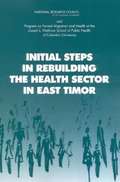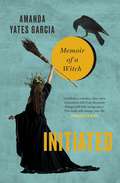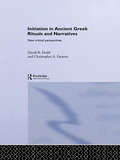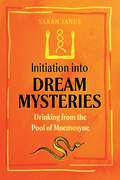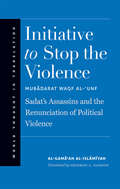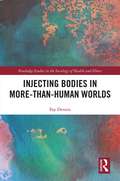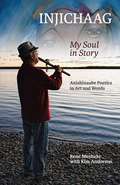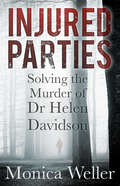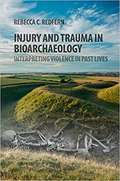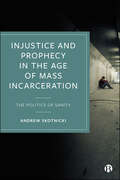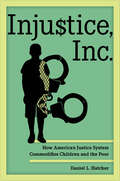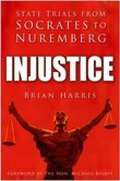- Table View
- List View
Inheritance: A Story of Property, Marriage and Madness
by Leo Hollis&‘Hollis expertly weaves together the human tragedy and high politics behind the explosion of one of the world&’s greatest cities.&’ Dan Snow In June 1701, a young widow, Mary Davies wakes up in a hotel room in Paris and finds a man in her bed. Within hours they are married. Yet three weeks later, Mary fled to London and swore that she had never agreed to the wedding. So begins one of the most intriguing stories of madness, tragic passions and the curse of inheritance. Inheritance charts the forgotten life of Mary Davies, born in London during the Great Plague of 1665, and the land that she inherited as a baby. This estate would determine the course of her tragic life. Hollis restores this history of child brides, mad heiresses, religious controversy and shady dealing. The drama culminated in a court case that determined not just the state of Mary&’s legacy, but the future of London itself. Today, Mary&’s inheritance is some of the most valuable real estate in the world.
Inheritance: An Autobiography of Whiteness
by Baynard WoodsIn this unflinching, honest narrative, an award-winning journalist discovers his family&’s heritage as slave owners in the South and grapples openly with his whiteness to inspire others to do the same. "Bracing, candid, and rueful." —Kirkus Baynard Woods thought he had escaped the backwards ways of the South Carolina he grew up in, a world defined by country music, NASCAR, and the confederacy. But when a white guy from his hometown of Columbia, S.C.—also the birthplace of secession— massacred nine Black people in Charleston in the name of Southern whiteness, Woods began to delve into his family&’s history—and the ways that history has affected his own life. Upon discovering that his family—both the Baynards and the Woodses—collectively claimed ownership of more than 700 people in 1860 and that his great-grandfather had assassinated a Black politician in 1871, Woods realized his own name was a confederate monument. With assiduous research and brutal self-analysis, Woods uncovers the details of his family&’s crimes and all of the mundane ways he inherited them…and their coverup. Along with his name, he had inherited privilege, wealth, and all the lies that his ancestors passed down through the generations. At a time where Southern states are embracing a return to authoritarian, anti-democratic principles, Woods' analysis of how we inherited our whiteness from the twisted psychology of Southern slavers is both trenchant and urgent—but always cast against the foibles and failures of his own life. Unflinching and uninhibited, Inheritance is a no-holds-barred memoir that exposes the story from Trump country that you haven&’t heard while excavating what it means to reckon with whiteness in America today and what it might mean to begin to repair the past.
Inheritance: The Evolutionary Origins of the Modern World
by Harvey Whitehouse“An insightful and breathtaking exploration of humanity’s evolutionary baggage that explains some of our species’ greatest successes and failures.” —Yuval Noah Harari, author of SapiensThe ancient inheritance that made us who we are—and is now driving us to ruin.Each of us is endowed with an inheritance—a set of evolved biases and cultural tools that shape every facet of our behavior. For countless generations, this inheritance has taken us to ever greater heights: driving the rise of more sophisticated technologies, more organized religions, more expansive empires. But now, for the first time, it’s failing us. We find ourselves hurtling toward a future of unprecedented political polarization, deadlier war, and irreparable environmental destruction.In Inheritance, renowned anthropologist Harvey Whitehouse offers a sweeping account of how our biases have shaped humanity’s past and imperil its future. He argues that three biases—conformism, religiosity, and tribalism—drive human behavior everywhere. Forged by natural selection and harnessed by thousands of years of cultural evolution, these biases catalyzed the greatest transformations in human history, from the birth of agriculture and the arrival of the first kings to the rise and fall of human sacrifice and the creation of multiethnic empires. Taking us deep into modern-day tribes, including terrorist cells and predatory ad agencies, Whitehouse shows how, as we lose the cultural scaffolding that allowed us to manage our biases, the world we’ve built is spiraling out of control.By uncovering how human nature has shaped our collective history, Inheritance unveils a surprising new path to solving our most urgent modern problems. The result is a powerful reappraisal of the human journey, one that transforms our understanding of who we are, and who we could be.
Inherited Responsibility and Historical Reconciliation in East Asia (Political Theories in East Asian Context)
by Jun-Hyeok Kwak and Melissa NoblesContemporary East Asian societies are still struggling with complex legacies of colonialism, war and domination. Years of Japanese imperial occupation followed by the Cold War have entrenched competing historical understandings of responsibility for past crimes in Korea, China, Japan and elsewhere in the region. In this context, even the impressive economic and cultural networks that have developed over the past sixty years have failed to secure peaceful coexistence and overcome lingering attitudes of distrust and misunderstanding in the region. This book examines the challenges of historical reconciliation in East Asia, and, in doing so, calls for a reimagining of how we understand both historical identity and responsibility. It suggests that by adopting a ‘forward-looking’ approach that eschews obsession with the past, in favour of a reflective and deliberative engagement with history, real progress can be made towards peaceful coexistence in East Asia. With chapters that focus on select experiences from East Asia, while simultaneously situating them within a wider comparative perspective, the contributors to this volume focus on the close relationship between reconciliation and ‘inherited responsibility’ and reveal the contested nature of both concepts. Finally, this volume suggests that historical reconciliation is essential for strengthening mutual trust between the states and people of East Asia, and suggests ways in which such divisive legacies of conflict can be overcome. Providing both an overview of the theoretical arguments surrounding reconciliation and inherited responsibility, alongside examples of these concepts from across East Asia, this book will be valuable to students and scholars interested in Asian politics, Asian history and international relations more broadly.
Inheriting Possibility: Social Reproduction and Quantification in Education
by Ezekiel J. Dixon-RománHow has the dominant social scientific paradigm limited our understanding of the impact of inherited economic resources, social privilege, and sociocultural practices on multigenerational inequality? In what ways might multiple forces of social difference haunt quantitative measurements of ability such as the SAT? Building on new materialist philosophy, Inheriting Possibility rethinks methods of quantification and theories of social reproduction in education, demonstrating that test performance results and parenting practices convey the impact of materially and historically contingent patterns of differential possibility.Ezekiel J. Dixon-Román explores the dualism of nature and culture that has undergirded theories of inheritance, social reproduction, and human learning and development. Research and debate on the reproduction of power relations have rested on a premise that nature is made up of fixed universals on which the creative, intellective, and discursive play of culture are based. Drawing on recent work in the physical and biological sciences, Dixon-Román argues that nature is culture. He contends that by assuming a rigid nature/culture binary, we ultimately limit our understanding of how power relations are reproduced. Through innovative analyses of empirical data and cultural artifacts, Dixon-Román boldly reconsiders how we conceptualize the processes of inheritance and approach social inquiry in order to profoundly sharpen understanding and address the reproducing forces of inequality.
Inheriting a Canoe Paddle
by Misao DeanIf the canoe is a symbol of Canada, what kind of Canada does it symbolize? Inheriting a Canoe Paddle looks at how the canoe has come to symbolize love of Canada for non-aboriginal Canadians and provides a critique of this identification's unintended consequences for First Nations. Written with an engaging, personal style, it is both a scholarly examination and a personal reflection, delving into representations of canoes and canoeing in museum displays, historical re-enactments, travel narratives, the history of wilderness expeditions, artwork, film, and popular literature.Misao Dean opens the book with the story of inheriting her father's canoe paddle and goes on to explore the canoe paddle as a national symbol - integral to historical tales of exploration and trade, central to Pierre Trudeau's patriotism, and unique to Canadians wanting to distance themselves from British and American national myths. Throughout, Inheriting a Canoe Paddle emphasizes the importance of self-consciously evaluating the meaning we give to canoes as objects and to canoeing as an activity.
Inheriting the City: The Children of Immigrants Come of Age
by Mary C. Waters Jennifer Holdaway John H. Mollenkopf Philip KasnitzThe United States is an immigrant nation—nowhere is the truth of this statement more evident than in its major cities. Immigrants and their children comprise nearly three-fifths of New York City’s population and even more of Miami and Los Angeles. But the United States is also a nation with entrenched racial divisions that are being complicated by the arrival of newcomers. While immigrant parents may often fear that their children will “disappear” into American mainstream society, leaving behind their ethnic ties, many experts fear that they won’t—evolving instead into a permanent unassimilated and underemployed underclass. Inheriting the City confronts these fears with evidence, reporting the results of a major study examining the social, cultural, political, and economic lives of today’s second generation in metropolitan New York, and showing how they fare relative to their first-generation parents and native-stock counterparts. Focused on New York but providing lessons for metropolitan areas across the country, Inheriting the City is a comprehensive analysis of how mass immigration is transforming life in America’s largest metropolitan area. The authors studied the young adult offspring of West Indian, Chinese, Dominican, South American, and Russian Jewish immigrants and compared them to blacks, whites, and Puerto Ricans with native-born parents. They find that today’s second generation is generally faring better than their parents, with Chinese and Russian Jewish young adults achieving the greatest education and economic advancement, beyond their first-generation parents and even beyond their native-white peers. Every second-generation group is doing at least marginally—and, in many cases, significantly—better than natives of the same racial group across several domains of life. Economically, each second-generation group earns as much or more than its native-born comparison group, especially African Americans and Puerto Ricans, who experience the most persistent disadvantage. Inheriting the City shows the children of immigrants can often take advantage of policies and programs that were designed for native-born minorities in the wake of the civil rights era. Indeed, the ability to choose elements from both immigrant and native-born cultures has produced, the authors argue, a second-generation advantage that catalyzes both upward mobility and an evolution of mainstream American culture. Inheriting the City leads the chorus of recent research indicating that we need not fear an immigrant underclass. Although racial discrimination and economic exclusion persist to varying degrees across all the groups studied, this absorbing book shows that the new generation is also beginning to ease the intransigence of U.S. racial categories. Adapting elements from their parents’ cultures as well as from their native-born peers, the children of immigrants are not only transforming the American city but also what it means to be American.
Inheriting the Holy Land: An American's Search for Hope in the Middle East
by Jennifer MillerWriting with fierce honesty, Jennifer Miller has created an extraordinary synthesis of history, reportage, and coming-of-age memoir in Inheriting the Holy Land. Her groundbreaking perspective on the conflict is presented through interviews with young Israelis and Palestinians and conversations with some of the most influential officials involved in the Middle East, including Shimon Peres, Yasir Arafat, James Baker, Benjamin Netanyahu, Colin Powell, Ehud Barak, and Mahmoud Abbas. This book will open eyes, open hearts, and open minds. Miller grew up in an affluent suburb of Washington, D.C., surrounded by the chaotic politics of the Middle East. Her father was a U.S. State Department negotiator at the Oslo and Camp David peace summits, and dinnertime conversation in the Miller household often included discussions of the Middle Eastern conflict. When Miller joined Seeds of Peace, a program that brings Middle Eastern kids to Maine for intensive sessions of conflict resolution, her real experience with the Middle East began. As she befriended young Palestinians, Israelis, Egyptians, and Jordanians, Jennifer came to realize that their views were missing from the ongoing debate over the Holy Land. By helping these young voices be heard, she knew she could reveal something vitally new and deeply challenging about the future of this torn region. Miller, however, learned fast that it was one thing to hang out at the idyllic Seeds for Peace camp in Maine and quite another to confront young people on their own turf-in the alleys of East Jerusalem, behind the armed gates of West Bank settlements, in the teeming refugee camps of Gaza. Friendships that had blossomed in the United States withered in the aftermath of yet another suicide bombing. Big-hearted teens on both sides of the conflict shocked Miller with the ferocity of their illusions and the twisted logic of their misconceptions. But she also found rays of hope in places where others had reported only despair--surprising open-mindedness among the ultra-religious, common ground shared by those who had lost loved ones to the violence, a yearning for peace amid the rubble of refugee camps and the shards of bombed cities. A deft writer, she interweaves her startlingly candid interviews with the vibrant realities of life in the streets. Just as Jennifer Miller was forced to confront her biases as an American, a Jew, a woman, and a journalist, in Inheriting the Holy Land, she similarly challenges readers to reexamine their own cherished prejudices and assumptions.
Inheriting the Trade: A Northern Family Confronts Its Legacy as the Largest Slave-trading Dynasty in U. S. History
by Thomas DewolfIn 2001, Thomas DeWolf discovered that he was related to the most successful slave-trading family in U.S. history, responsible for transporting at least ten thousand Africans. This is his memoir of the journey in which ten family members retraced their ancestors' steps through the notorious triangle trade route--from New England to West Africa to Cuba--and uncovered the hidden history of New England and the other northern states.
Inhuman Bondage: The Rise And Fall Of Slavery In The New World
by David Brion DavisDavid Brion Davis has long been recognized as the leading authority on slavery in the Western World. His books have won every major history award--including the Pulitzer Prize and the National Book Award--and he has been universally praised for his prodigious research, his brilliant analytical skill, and his rich and powerful prose. Now, in Inhuman Bondage , Davis sums up a lifetime of insight in what Stanley L. Engerman calls "a monumental and magisterial book, the essential work on New World slavery for several decades to come." Davis begins with the dramatic Amistad case, which vividly highlights the international character of the Atlantic slave trade and the roles of the American judiciary, the presidency, the media, and of both black and white abolitionists. The heart of the book looks at slavery in the American South, describing black slaveholding planters, the rise of the Cotton Kingdom, the daily life of ordinary slaves, the highly destructive internal, long-distance slave trade, the sexual exploitation of slaves, the emergence of an African-American culture, and much more. But though centered on the United States, the book offers a global perspective spanning four continents. It is the only study of American slavery that reaches back to ancient foundations (discussing the classical and biblical justifications for chattel bondage) and also traces the long evolution of anti-black racism (as in the writings of David Hume and Immanuel Kant, among many others). Equally important, it combines the subjects of slavery and abolitionism as very few books do, and it illuminates the meaning of nineteenth-century slave conspiracies and revolts, with a detailed comparison with 3 major revolts in the British Caribbean. It connects the actual life of slaves with the crucial place of slavery in American politics and stresses that slavery was integral to America's success as a nation--not a marginal enterprise. A definitive history by a writer deeply immersed in the subject, Inhuman Bondage offers a compelling narrative that links together the profits of slavery, the pain of the enslaved, and the legacy of racism. It is the ultimate portrait of the dark side of the American dream. Yet it offers an inspiring example as well--the story of how abolitionists, barely a fringe group in the 1770s, successfully fought, in the space of a hundred years, to defeat one of human history's greatest evils.
Inhuman Citizenship: Traumatic Enjoyment and Asian American Literature
by Juliana ChangIn Inhuman Citizenship, Juliana Chang claims that literary representations of Asian American domesticity may be understood as symptoms of America&’s relationship to its national fantasies and to the &“jouissance&”—a Lacanian term signifying a violent yet euphoric shattering of the self—that both overhangs and underlies those fantasies. In the national imaginary, according to Chang, racial subjects are often perceived as the source of jouissance, which they supposedly embody through their excesses of violence, sexuality, anger, and ecstasy—excesses that threaten to overwhelm the social order.To examine her argument that racism ascribes too much, rather than a lack of, humanity, Chang analyzes domestic accounts by Asian American writers, including Fae Myenne Ng&’s Bone, Brian Ascalon Roley&’s American Son, Chang-rae Lee&’s Native Speaker, and Suki Kim&’s The Interpreter. Employing careful reading and Lacanian psychoanalysis, Chang finds sites of excess and shock: they are not just narratives of trauma; they produce trauma as well. They render Asian Americans as not only the objects but also the vehicles and agents of inhuman suffering. And, claims Chang, these novels disturb yet strangely exhilarate the reader through characters who are objects of racism and yet inhumanly enjoy their suffering and the suffering of others.Through a detailed investigation of &“family business&” in works of Asian American life, Chang shows that by identifying with the nation&’s psychic disturbance, Asian American characters ethically assume responsibility for a national unconscious that is all too often disclaimed.
Inhuman Conditions: On Cosmopolitanism and Human Rights
by Pheng CheahGlobalization promises to bring people around the world together, to unite them as members of the human community. To such sanguine expectations, Pheng Cheah responds deftly with a sobering account of how the "inhuman" imperatives of capitalism and technology are transforming our understanding of humanity and its prerogatives. Through an examination of debates about cosmopolitanism and human rights, Inhuman Conditions questions key ideas about what it means to be human that underwrite our understanding of globalization. Cheah asks whether the contemporary international division of labor so irreparably compromises and mars global solidarities and our sense of human belonging that we must radically rethink cherished ideas about humankind as the bearer of dignity and freedom or culture as a power of transcendence. Cheah links influential arguments about the new cosmopolitanism drawn from the humanities, the social sciences, and cultural studies to a perceptive examination of the older cosmopolitanism of Kant and Marx, and juxtaposes them with proliferating formations of collective culture to reveal the flaws in claims about the imminent decline of the nation-state and the obsolescence of popular nationalism. Cheah also proposes a radical rethinking of the normative force of human rights in light of how Asian values challenge human rights universalism.
Ininatig's Gift of Sugar: Traditional Native Sugarmaking
by Laura Waterman WittstockWhen his people were about to starve, Ininatig said: "I will teach you a way to make food so that you will never have to starve." And that it how the people learned to make maple sugar.
Initial Steps In Rebuilding The Health Sector In East Timor
by Ian Morris Jim Tulloch Fadia Saadah Rui Maria de Araujo Rui Paulo de Jesus Sergio Lobo Isabel Hemming Jane NassimInformation on the Initial Steps In Rebuilding The Health Sector In East Timor
Initiated: Memoir of a Witch
by Amanda Yates GarciaAn initiation signals a beginning: a door opens and you step throughAmanda Yates Garcia's mother initiated her into the goddess-worshipping practice of witchcraft when she was thirteen years old, but Amanda's true life as a witch only began when she underwent a series of spontaneous initiations of her own.Descending into the underworlds of poverty, sex work and misogyny, Initiated describes Amanda's journey to return to her body, harness her natural power, and finally reclaim her witchcraft to create the magical world she envisioned. Peppered with mythology, tales of the goddesses and magical women throughout history, Initiated stands squarely at the intersection of witchcraft and feminism. Amanda shows that practising magic is about more than spells and potions; magic is nothing less than claiming power for oneself and taking back our planet in the name of Love. Initiated is both memoir and manifesto, calling the magical people of the world to take up their wands, be brave, and create the enchanted world they long to live in.'Godesses, ecstasies, fairy tales: Initiated is full of my favourite things, told with savage grace. This book will change your life.' FRANCESCA LIA BLOCK
Initiation in Ancient Greek Rituals and Narratives: New Critical Perspectives
by Christopher A. Faraone David B. DoddScholars of classical history and literature have for more than a century accepted `initiation' as a tool for understanding a variety of obscure rituals and myths, ranging from the ancient Greek wedding and adolescent haircutting rituals to initiatory motifs or structures in Greek myth, comedy and tragedy. In this books an international group of experts including Gloria Ferrari, Fritz Graf and Bruce Lincoln, critique many of these past studies, and challenge strongly the tradition of privileging the concept of initiation as a tool for studying social performances and literary texts, in which changes in status or group membership occur in unusual ways. These new modes of research mark an important turning point in the modern study of the religion and myths of ancient Greece and Rome, making this a valuable collection across a number of classical subjects.
Initiation into Dream Mysteries: Drinking from the Pool of Mnemosyne
by Sarah Janes• Presents effective exercises and techniques, inspired by ancient texts, to deepen your personal awareness of the dream state and experiment with dreams for healing and divinatory purposes• Each initiatory chapter includes a psychodramatic narrative designed to generate the perfect dream for each stage in the initiation• Explains how dreaming has influenced cultural, religious, and spiritual thinking• Includes access to a seven-part hypnagogic guided journey recordingInvoking Mnemosyne—Greek goddess of memory and eloquence, daughter of Heaven and Earth, mother of the Muses, and archetypal deity of the Asklepion dream temple tradition—this book initiates you into full dream consciousness, offering a lucid-dreaming ritual experience in the spirit of the Mystery Schools of antiquity.Sharing her more than a decade of research on Sleep Temples and Mystery Schools of the Esoteric Tradition, lucid-dreaming instructor Sarah Janes explores the evolution of imagination, memory, and consciousness throughout the ages and proposes that dreams have been fundamental in the creation and development of culture. Dreams play an important role in ancestor worship, afterlife beliefs, animism, religion, and wisdom traditions. Explaining how a conscious dream life is essential for self-discovery, deep integration, and healing, Sarah presents exercises, techniques, initiations, and seven guided audio meditations to help you explore the inner depths of your psyche. Sarah reveals how dreams offer us an opportunity to remember and directly experience our divinity, to transcend the limitations of our mortality and enter timeless imaginal realms. These realms, accessible through dreams, can help you to form a better understanding of who you are.Employing the power of story to affect the mind and lay down new neural pathways—as if one were really living the story—Sarah connects each initiatory chapter with a psychodramatic narrative as well as a guided audio meditation. Using symbolism and powerful imagery, these stories, combined with her meditations, help you generate the perfect dreams for each stage in the initiation. And by becoming a better dreamer, you can make better, more aware decisions in your waking life.
Initiative to Stop the Violence
by Prof. Sherman Jackson al-Gama'ah al-IslamiyahFormerly one of the largest and most militant Islamic organizations in the Middle East, Egypt's al-Gama'ah al-Islamiyah is believed to have played an instrumental role in numerous acts of global terrorism, including the assassination of President Anwar Sadat and the 1993 World Trade Center bombing. In later years, however, the organization issued a surprising renunciation of violence, repudiating its former ideology and replacing it with a shari'a-based understanding and assessment of the purpose and proper application of jihad. This key manifesto of modern Islamist thought is now available to an English-speaking audience in an eminently readable translation by noted Islamic scholar Sherman A. Jackson. Unlike other Western and Muslim critiques of violent extremism, this important work emerges from within the movement of Middle Eastern Islamic activism, both challenging and enriching prevailing notions about the role of Islamists in fighting the scourge of extremist politics, blind anti-Westernism and, alas, wayward jihad.
Injecting Bodies in More-than-Human Worlds: ediating Drug-Body-World Relations
by Fay DennisDrug use is widely understood in terms of its subjects, substances and settings. But what happens when these distinctions start to blur? Injecting Bodies in More-than-Human Worlds moves away from a hierarchical conceptualisation of drug use based on its subjects and their objects, offering unique and fresh insights into the complex world of injecting drugs. Focussing on the Deleuzian notion of bodies-in-process, Dennis proposes a new and timely approach to drugs where agency materialises in relation to others – human and not. Using rich, ethnographic data to demonstrate bodies’ in/capacities to act through their relationality, Dennis carefully maps out where bodies are thought, practised, lived and intervened-with: caught in tension between pleasure and addiction, activity and passivity, ‘becoming-other’ and ‘becoming-blocked’, and making and breaking habits. Arguing for a deeper engagement both with how bodies are enacted and with our collective responsibility to bring them together in healthier ways, this volume offers a unique intervention into the sociology of drugs and, more widely, health and illness. It will appeal to students and researchers interested in fields such as Science and Technology Studies, Sociology and Social Policy, Drugs and Addiction, and Health and Medical Anthropology.
Injichaag: Anishinaabe Poetics in Art and Words
by Rene MeshakeThis book shares the life story of Anishinaabe artist Rene Meshake in stories, poetry, and Anishinaabemowin “word bundles” that serve as a dictionary of Ojibwe poetics. Meshake was born in the railway town of Nakina in northwestern Ontario in 1948, and spent his early years living off-reserve with his grandmother in a matriarchal land-based community he calls Pagwashing. He was raised through his grandmother’s “bush university,” periodically attending Indian day school, but at the age of ten Rene was scooped into the Indian residential school system, where he suffered sexual abuse as well as the loss of language and connection to family and community. This residential school experience was lifechanging, as it suffocated his artistic expression and resulted in decades of struggle and healing. Now in his twenty-eighth year of sobriety, Rene is a successful multidisciplinary artist, musician and writer. Meshake’s artistic vision and poetic lens provide a unique telling of a story of colonization and recovery. The material is organized thematically around a series of Meshake’s paintings. It is framed by Kim Anderson, Rene’s Odaanisan (adopted daughter), a scholar of oral history who has worked with Meshake for two decades. Full of teachings that give a glimpse of traditional Anishinaabek lifeways and worldviews, Injichaag: My Soul in Story is “more than a memoir.”
Injured Parties: Solving the Murder of Dr Helen Davidson
by Monica WellerOn 9 November 1966, popular GP Dr Helen Davidson was battered to death in dense woodland while birdwatching and exercising her dog a few miles from her Buckinghamshire home. Her body was found the next day, her eyes having been pushed into her skull. ‘She had binoculars round her neck, spied illicit lovers, was spotted, and one or both of them killed her,’ surmised Detective Chief Superintendent Jack ‘Razor’ Williams of New Scotland Yard. He had received fifty police commendations in his career, yet not one for a murder enquiry. Unsurprisingly, within weeks the police operation was wound down, Williams retired, and another cold case hit the statistics. Fifty years later, amateur sleuth and author Monica Weller set about solving the murder – without the help of the prohibited files. As she sifted the evidence, a number of suspects and sinister motives began to emerge; it was clear it was not a random killing after all. Weller uncovered secret passions, deep jealousies, unusual relationships and a victim with a dark past. Her persistence and dedication were dramatically rewarded when she uncovered the identity of the murderer – revealed here for the first time.
Injury and Trauma in Bioarchaeology
by Rebecca C. RedfernThe remains of past people are a testament to their lived experiences and of the environment in which they lived. Synthesising the latest research, this book critically examines the sources of evidence used to understand and interpret violence in bioarchaeology, exploring the significant light such evidence can shed on past hierarchies, gender roles and life courses. The text draws on a diverse range of social and clinical science research to investigate violence and trauma in the archaeological record, focussing on human remains. It examines injury patterns in different groups as well as the biological, psychological and cultural factors that make us behave violently, how our living environment influences injury and violence, the models used to identify and interpret violence in the past, and how violence is used as a social tool. Drawing on a range of case studies, Redfern explores new research directions that will contribute to nuanced interpretations of past lives.
Injustice and Prophecy in the Age of Mass Incarceration: The Politics of Sanity
by Andrew SkotnickiWhy do the UK and US disproportionately incarcerate the mentally ill, frequently poor people of color? Via multiple re-framings of the question—theological, socioeconomic, and psychological— Andrew Skotnicki diagnoses a persecution of the prophetic at the heart of the contemporary criminal justice system. This interdisciplinary book draws on criminology, theology, philosophy, sociology, psychology, and psychiatric history to consider the increasingly intractable issue of mass incarceration. Inviting a new, collaborative conversation on penal reform as a fundamentally life-affirming project, it defends the dignity of those diagnosed as mentally unstable and their capacity for spiritual transcendence.
Injustice, Inc.: How America's Justice System Commodifies Children and the Poor
by Daniel L. HatcherAn unflinching exposé of how the family, juvenile, and criminal justice systems monetize the communities they purport to serve and trap them in crushing poverty Injustice, Inc. exposes the ways in which justice systems exploit America's history of racial and economic inequality to generate revenue on a massive scale. With searing legal analysis, Daniel L. Hatcher uncovers how courts, prosecutors, police, probation departments, and detention facilities are abandoning ethics to churn vulnerable children and adults into unconstitutional factory-like operations. Hatcher reveals stark details of revenue schemes and reflects on the systemic racialized harm of the injustice enterprise. He details how these corporatized institutions enter contracts to make money removing children from their homes, extort fines and fees, collaborate with debt collectors, seize property, incentivize arrests and evictions, enforce unpaid child labor, maximize occupancy in detention and "treatment" centers, and more. Injustice, Inc. underscores the need to unravel these predatory operations, which have escaped public scrutiny for too long.
Injustice: State Trials from Socrates to Nuremberg
by Brian Harris Michael BeloffTo a lawyer, injustice is the unfair conduct of a trial. This book looks into several notorious cases of supposed injustice, Socrates, Joan of Arc, Charles I, Admiral Byng, Lord Haw-Haw, and the Nuremberg Trials. It looks for answers to the legal question 'was the trial fair?', and the humane question 'was the accused guilty or innocent?'.
